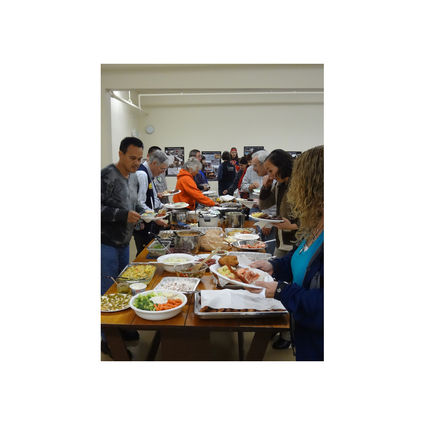Unity Banquet brings folk together with food

Dan Rudy/ Wrangell Sentinel
At Saturday evening's Unity Banquet, Jack Strong describes the Bear Song, one about a mother worrying about her children. "Someone should be hollering in my ear," Strong relates. "How are my children doing?"
Scores of people lined up with plates for Wrangell's Alaska Native Sisterhood Camp 1 and Alaska Native Brotherhood Camp 4 third annual Unity Dinner on Saturday evening. Participants partook in a bit of fellowship and marked the start of November's National Native Heritage Month.
"The theme of this Unity Dinner is 'let's work together,'" explained Virginia Oliver, Wrangell's Johnson-O'Malley coordinator. Members from all seven Wrangell clans were there, plus visitors from neighboring communities.
The banquet featured a variety of foods, many of which are traditional autumn dishes native to the surrounding islands. A variety of dried, smoked and baked fishes, prepared seaweed, moose and venison platters, roe and other potluck essentials were brought by community members.
"The food sort of holds us together," said ANS Camp 1 president, Sandy Churchill. Though other aspects of Tlingit culture like its dress and language were largely lost, or at different times suppressed, she explained the culinary bonds to the land and sea remain unbroken.
Promoting these ties has been the Traditional Foods program run by the SouthEast Alaska Regional Health Consortium (SEARHC). The program offers community-based activities aimed at making Alaska's traditional and customary Native foods a regular part of people's diet. It also partners with elders and experts to teach gathering, harvesting and processing skills for local fish and plants. SEARHC also integrates Native dance, language, storytelling and culture into the program.
An extended six-year grant funded Wrangell's program until recently. It will now be continued by the local ANS-ANB.
At the dinner, the service Ken Hoyt performed with the Traditional Foods project was recognized. Hoyt finished with the program Friday. Regional SEARHC staffers came down to participate at the dinner as well and expressed their thanks for the work he had done over the past three years.
"I'd like to thank Wrangell for welcoming him and working with him," said Clara Gray, a health systems specialist.
During Hoyt's time here, the program established a smokehouse and community garden, as well as a pair of freezers for preserving harvested foods.
"It has been a really eye-opening and honoring experience," Hoyt told banquet attendees. He was optimistic the program would continue to make an impact in Wrangell. "It's about the unity amongst the tribes, amongst the clans, the whole community."
The dinner itself was a community effort, with Native and non-Native residents and businesses alike contributing food, door prizes and materials.
The All-Wrangell Dancers performed a variety of songs and dances from both the Raven and Eagle moieties of the Shtax'heen tribe, plus some from other Tlingit groups.
During "The Clan Song" everybody got to join in as their different tribal and national backgrounds were called on, showing support with a dance or donation to Hoyt's farewell fund. Hoyt left on the ferry earlier this week for Idaho, where he will continue his higher education.
SEARHC staff also distributed educational coloring books Gray put together, entitled "Good Beach Food," which teaches youngsters about local foods and the Tlingit words used to describe them. Copies of the book are available from Oliver.
"I really appreciate being invited up to this event," announced visitor Jack Strong, a supporter of traditional foods. "I just want to reiterate what it's about."
For him, both the dinner and the Traditional Foods program celebrate an important aspect of Native culture, as well as expressing a social and financial independence. Take potatoes, for example: "If you're growing them, it isn't costing you anything but the time you put in."
The unity found on people's plates extends also to the food's source, the Stikine River.
"We all need to grow together," cautioned Apryl Hutchinson, a member of the WCA board.
One pressing issue she said that requires united action is the transboundary waters issue, where sizable Canadian mining projects are being developed upstream of Southeast Alaska's major rivers and posing a considerable risk to both the fisheries and subsistence way of life here.
This year, the Central Council Tlingit and Haida Indian Tribes of Alaska joined other groups on the United Tribal Transboundary Mining Workgroup, which has been spearheading opposition to the development of open-pit mines by gathering a coalition of industry and trade groups to pressure the federal government to take a more active role on the issue.
In all, the evening was a success. Churchill said she is already looking forward to next year, when Wrangell will be hosting the ANS-ANB Grand Camp Convention in October. Wrangell's camps last hosted the convention in 1998.

Dan Rudy/ Wrangell Sentinel
People line up for good, local food at the third annual Unity Dinner on Saturday at the Stikine Native Organization building.
"We're looking for a lot of help," she said. It will be a big event, and with good reason: "It's our 100th year for the ANS Wrangell Camp 1."




Reader Comments(0)